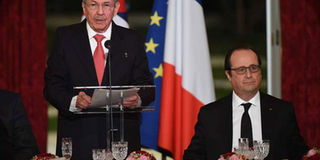With Castro’s revolution under threat, black Cubans will get raw end

Cuban President Raul Castro (left) delivers a speech next to French President Francois Hollande during a state dinner for the president of Cuba at the Elysee Presidential Palace in Paris on February 1, 2016. PHOTO | AFP
What you need to know:
- The re-opening of the US embassy in Havana and the warming up of relations has brought a sudden influx of dollars from remittances and tourists.
- Castro’s 1959 revolution promised social equality, and he largely delivered.
- After the revolution, many of these rich families fled to Miami, where they kept up an anti-Castro din.
- With no access to capital, and no well-to-do family relations living abroad to send back money, black Cubans are being systematically excluded from the benefits of economic liberalisation.
The real Fidel Castro in Cuba must be watching the unfolding of the US diplomatic opening to his country with a deep sense of foreboding.
It is not that Barack Obama had mischief in mind when he sought to roll back decades of US animosity directed at Cuba. He clearly had only goodwill. Nor was President Raul Castro, Fidel’s brother and successor, thinking anywhere of harming Cuba’s interests when he welcomed Obama’s olive branch.
The re-opening of the US embassy in Havana and the warming up of relations has brought a sudden influx of dollars from remittances and tourists.
Sadly, as a poignant Reuters news article put it last week, black Cubans are being left out of the boom. In turn, is fuelling a racial divide hitherto unknown in the island nation.
Outright discrimination is not the problem. This has always been rare in Cuba. The emerging problem is the growing wealth gap.
Castro’s 1959 revolution promised social equality, and he largely delivered. He gave Cubans universal public education and service delivery, plus near comprehensive state-led employment, even if the pay was low.
Indisputably, black Cubans felt immensely comfortable, if not necessarily materially, then from that intangible and very liberating warmth of belonging to an inclusive state.
Historically, Cuban blacks – who account for 10 per cent of the population – did not count any powerful families among them. Whites (Spanish-Cubans) did.
After the revolution, many of these rich families fled to Miami, where they kept up an anti-Castro din. The relatives they left behind are the ones receiving the dollar remittances which can now be sent legally from abroad following Obama’s overtures. This hard currency is being used to open businesses like restaurants, bars and hotels targeting tourists, who are suddenly flooding to Cuba with even more dollars.
ACCESS TO CAPITAL
With no access to capital, and no well-to-do family relations living abroad to send back money, black Cubans are being systematically excluded from the benefits of economic liberalisation.
This opening up is coming hand in hand with creeping US-style capitalism, in all its vulgarity. It is all very unsettling for a community whose vulnerability the Castro state understood and sought to protect from foreign harm.
For me, Castro’s greatest achievement was not because he kept socialism alive in Cuba, and in the courageous face of the baleful enmity of a nearby Goliath. His greatest achievement was the creation of a colour-blind society.
When America talks of exporting “democracy” to Cuba, the stoic Cubans brace for an invasion not just of the dollar, but of America’s own awful and complex political and social problems. There is nothing to compare with the first-rate education and healthcare systems Cubans have – which come entirely for free – and the social stability they enjoy.
Without doubt, the ugliest feature of America is its deep-rooted racism. Don’t deceive yourself that the Obama presidency has done anything fundamental about this.
I know Cuba is one of the very few non-African countries where a black person can have a normal life without the drawback of ingrained racism. It sure is not a paradise, but on the mentioned score Castro deserves our eternal gratitude. You can’t say the same of America, or Brazil, or many of those Caribbean island statelets that sell themselves as tourist havens.
IRISH ROOTS
While it is customary for, say, Africans to celebrate Obama and the Irish people to do the same with the illustrious Kennedy family because of its Irish roots, Cubans of all colours find little to bond with politically beyond nationality with the Cuban political stars who pop up in America.
Two of them, Marco Rubio and Ted Cruz, are doing very well so far in the Republican presidential primaries.
Yet the pair represent a kind of politics that is totally alien to Castro’s Cuba. Even by the right-wing standards of politics espoused by the Cuban exiles based in Miami, the two candidates are way out there in their extremism. Like somewhere in the Andromeda galaxy.
A lot remains to be done before relations between America and Cuba can be said to be back to full normality. The US-imposed trade embargo against Cuba remains.
To end it, Congress must approve, but it is in no mood to do so. The Republican party which is currently in control of the Congress is beholden to the Cuban-American establishment in Florida, more so in an election year like this one.
Sorry Cuba, you will have to wait.





